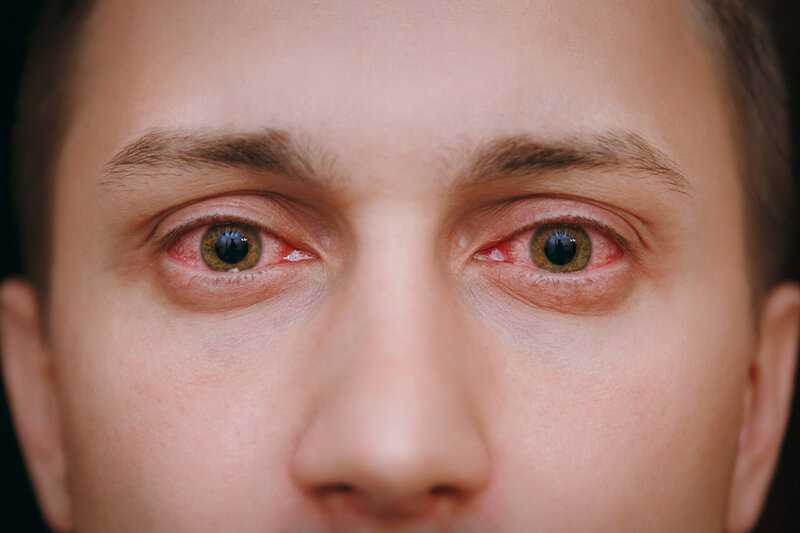10 Reasons You Have Red Eyes

Are your eyes looking red and irritated?
Red eyes are one of the first signs that there is something going on and that treatment may be needed. In most cases, you’ll be able to treat the problem at home by flushing the eyes, using eye drops, and avoiding irritants. Other times, your red eyes may need attention from your family optometrist.
Note: Your red eyes may also itch or burn, which makes you want to rub them. Resist the urge! Rubbing your eyes may provide immediate relief but can actually do more harm than good.
10 Common Causes of Red Eyes (And What To Do About Them)
Here are 10 of the most common reasons your eyes are red with simple instructions on how to treat them.
Allergies
We’re posting this right in the middle of spring, which is a major cause of allergies for children and adults in the Sapulpa area. From pet dander, pollen, and dust to direct contact with grass or hay, allergies can do a number on the eyes.
Most allergies can be controlled via over-the-counter allergy medications. While allergy-specific eye drops can reduce redness and de-itch the eyes, they often have ingredients/preservatives that exacerbate irritation. We recommend using preservative-free eye drops instead to flush irritants out and soothe irritated eyes. A moist warm compress also soothes red, swollen, or itchy eyes.
Foreign object in the eye
Your eyes let you know immediately when a foreign object lands on its surface. Redness, irritation, and tearing are common reactions. Flushing the eyes typically does the trick unless the foreign object penetrates the membranes or is sharp.
Read, Removal of Foreign Object From Eye: DIY or Eye Doctor, for more specifics.
Air pollution (including smoke or work-associated toxins)
Some people are more sensitive than others to air pollution, including smoke or toxic fumes from work- or hobby-related substances. Flushing the eyes will help; as can eye drops. If your work or hobbies put you in contact with known toxins, consider getting a high-quality pair of sealed safety goggles to protect them.
Dry air
Our eyes like to be in environments with humidity levels around 45% to keep them moist and to support a healthy tearing/flushing cycle. When humidity levels dip lower than 45%, eyes can feel dry and this irritates them. Preservative-free eye drops can help.
Conditioned air (both heated and cooled cycles) dry out the air, so consider installing a whole-home or whole-office humidity system to keep humidity levels regulated in your home or office.
Too much screen time
The more humans use screens the more eye doctors are seeing patients with screen-related complaints. The American Academy of Ophthalmology advocates protecting your eyes from screen time because of the risks it poses to the eyes.
Besides redness, too much screen time causes:
- Eyestrain
- Dry eye
- Headaches
- Eye irritation
Practicing healthy screen habits minimizes these issues. If you work in front of a computer or spend ample time on your phone, the AAO recommends:
- Keeping the monitor/screen at least arm’s length from your face
- Use the device’s settings to reduce screen glare
- Adjust lighting so ambient light (the light in the room) is brighter than the screen
- Use the 20-20-20 rule: Take a break every 20 minutes, stare at least 20 feet away, and keep doing that for at least 20 seconds
- Keep eyes moist using artificial tears (if necessary) since we tend to blink less when staring at a screen and that dries (and irritates) the eyes
- Limit screen time before bed to support healthy sleep cycles
Direct chemical exposure (e.g. swimming pool chlorine)
Normally, you’ll know if your eyes are directly exposed to chemicals (a cause for calling your optometrist and having someone close by reading the chemical instructions for treating exposure to the eyes). However, swimming pools are a common eye irritant in the summer and people forget that their eyes come into direct contact with chlorine or bromine while swimming.
Flush your eyes with cool, fresh water after every swim to ensure all of the chlorine or bromine is washed out, which can help to minimize post-swim redness and burning.
Overexposure to sunlight (including in the snow)
Eyes can get sunburned too in a way. The UV rays in sunlight is actually a form of radiation and it can burn and damage the delicate tissues of the eye. Always wear UV-safe sunglasses when you are outside, especially when you are near bodies of water or snow, which reflect and magnify harmful UV radiation. We also recommend that patients wear a broad-brimmed hat to further protect the eyes from direct sun exposure.
Colds or flu
They say the eyes are the windows to the soul, but they are also the windows to your body’s health as well. We can tell so much from looking into our patient’s eyes. If you have a cold or flu, especially those that affect the sinuses, your eyes tell the story. Warm, moist compresses feel good and relieve eye irritation and puffiness.
Infections can also cause red eyes
Sometimes your cold or flu may manifest in an eye infection, but there is a long list of other eye-related infections. One of the most common is called pink eye (conjunctivitis) and is highly contagious. Other common eye infections include keratitis (inflammation of the cornea), blepharitis (inflammation of the eyelid), a stye (inflammation of an oil duct in the inner-lid), or infections that follow an eye surgery.
In addition to having red eyes or two, most eye infections also create tearing or watering and often yield eye gunk (mucus) in excess that is yellow/green in appearance and has a tendency to stick eyelashes shut. Infected eyes usually feel itchy, scratchy, or you may feel a slight stinging sensation.
These should be evaluated by an optometrist or physician and are usually easy to treat with prescription eye drops. Never use old prescription drops to treat what you assume to be an infection. Eye infections can be caused by viruses, bacteria, or yeast. Using the wrong drops can make the infection even worse.
Eye trauma
Whether your eye experiences trauma due to blunt force (a ball or fist) or via penetration (something that sticks directly into the eye), it is bound to turn red. Sometimes, the redness is simply part of the eye’s inflammatory response as your body works to protect and heal the injured eye. Other times, ruptured blood vessels create a pool of blood, underneath the membrane and inside eye tissues, that appears bright red.
Eye trauma is always worth a call to your eye doctor so s/he can ask questions and determine whether or not you can heal at home or if an exam is needed to address the level of the injury.
Are your red eyes causing you problems? Schedule an appointment with us here at Eye to Eye Family Vision Care to schedule an appointment. You can also give us a call at 918-227-3937 to answer any questions you might have.

